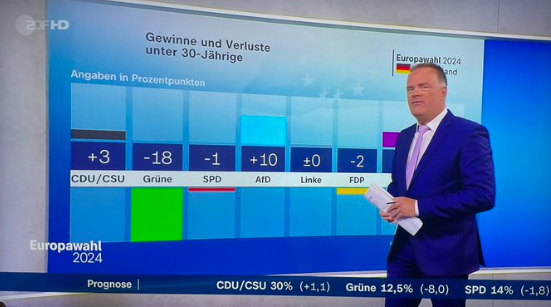France has made a dire mistake, at least for Macron… The Germans do not want to repeat it
In response to demands for a snap election from the opposition, Chancellor Olaf Scholz’s spokesman, Steffen Hebestreit, has declared that Germany will not be moving up its electoral schedule despite disappointing results for the ruling coalition in the recent EU elections. Hebestreit emphasized that the next national election will take place as originally planned next fall, highlighting the differences between the political systems of Germany and France, where President Emmanuel Macron called for parliamentary elections following his own electoral setbacks.
Leftist German Government Pressured on Snap Election After Embarrassing Defeat to Conservatives, Populistshttps://t.co/K66rfKIiPD
— Breitbart London (@BreitbartLondon) June 10, 2024
The suggestion for an early election was strongly voiced by Markus Söder, the Premier of Bavaria, who proposed that Germany should consider a similar approach to France in response to the political tide. Additionally, Alice Weidel, co-leader of the far-right Alternative for Germany (AfD) party, which experienced a notable increase in support during the European Parliament elections, also demanded a snap election. Weidel criticized the current government’s policies as being detrimental to German citizens, stating that the populace is fed up with the current leadership.
AfD make significant gains tonight in Germany.
Exit poll data by Infratest dimap, shows support for AfD among voters below the age of 25 has skyrocketed.
Europe is awakening. pic.twitter.com/2rmAhvgyMh
— Tommy Robinson 🇬🇧 (@TRobinsonNewEra) June 9, 2024
The resistance to calls for an early election comes at a time when the ruling coalition is facing significant challenges, including dissatisfaction among voters and internal discord within the coalition parties. The AfD’s rise in popularity, particularly evident in their EU election performance, has added pressure on the government, highlighting the growing polarization in German politics.
This decision to stick to the scheduled election timeline reflects the government’s intent to maintain stability and perhaps to allow more time to address the concerns of the electorate and improve their standing with voters. Meanwhile, the political debate in Germany continues to heat up, with opposition parties likely to use the EU election results as leverage to rally support and challenge the coalition’s policies and governance approach in the lead-up to the national election.
AfD gains in Germany and wins by Conservatives in France’s elections and Italy send clear messages. The times are a changing !! So buckle up @liberal_party your ouster is next pic.twitter.com/XQk6zXmqBY
— Vincelli_D (@VincelliD97900) June 10, 2024
Major Points:
- Chancellor Olaf Scholz’s spokesman, Steffen Hebestreit, announced that Germany will not hold a snap election despite calls from the opposition following poor EU election results for the ruling coalition.
- Hebestreit highlighted the differences between German and French political systems, referencing French President Emmanuel Macron’s decision to call for parliamentary elections after his electoral defeat.
- Markus Söder, Bavaria’s state premier, and Alice Weidel, co-leader of the far-right Alternative for Germany (AfD) party, both advocated for early elections.
- Weidel criticized the government’s policies as being against the interests of Germans, attributing her party’s gain in support during the EU elections to widespread public discontent.
- The German government’s decision to stick to the planned election schedule aims to maintain stability and address voter concerns ahead of next fall’s national election.
James Kravitz – Reprinted with permission of Whatfinger News



